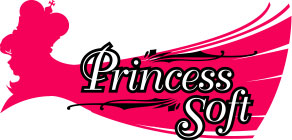Difference between revisions of "PrincessSoft"
From Sega Retro
Hyperspeed34 (talk | contribs) |
m (Text replacement - "| mergedwith= | mergedinto= " to "") |
||
| (2 intermediate revisions by one other user not shown) | |||
| Line 4: | Line 4: | ||
| defunct=2009 | | defunct=2009 | ||
| tseries=T-465 | | tseries=T-465 | ||
| − | |||
| − | |||
| headquarters=[[wikipedia:Chiyoda, Tokyo|Chiyoda, Tokyo, Japan]] | | headquarters=[[wikipedia:Chiyoda, Tokyo|Chiyoda, Tokyo, Japan]] | ||
}} | }} | ||
Latest revision as of 14:22, 27 February 2023

| ||
| PrincessSoft | ||
|---|---|---|
| Founded: 2000-11-09[1] | ||
| Defunct: 2009 | ||
| T-series code: T-465 | ||
Headquarters:
|
This short article is in need of work. You can help Sega Retro by adding to it.
PrincessSoft (プリンセスソフト) was a sub-label of Japanese video game publisher Oaks Corporation (株式会社オークス) (previously Zerosystem) which specialized in porting visual novels to home consoles like the Dreamcast. It featured two imprints: Primavera, which specialized in female-oriented markets, and Nine's Fox, which specialized in visual novels with adult content.
The company released its last game in 2009, and the brand has since been discontinued.
Softography
Dreamcast
- D+Vine (2001)
- 21: Two One (2001)
- Nijuuei (2002)
- Metal Wolf (2002)
- Suika (2002)
- Mei ☆ Puru (2002)
- Happy Breeding (2003)
- Cafe Little Wish (2003)
- Merge: Marginal (2003)
- Moekan (2003)
- Tenohira wo, Taiyou Ni (2004)
External links
References
- ↑ http://www.oaks-soft.co.jp/info.html (Wayback Machine: 2001-03-02 17:20)